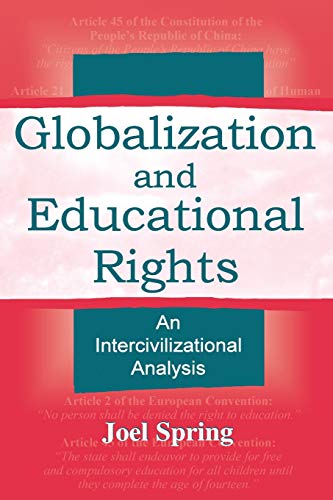Verwandte Artikel zu Globalization and Educational Rights: An Intercivilizational...
Globalization and Educational Rights: An Intercivilizational Analysis (Sociocultural, Political, and Historical Studies in Education) - Softcover

Inhaltsangabe
This is the first book to explore the meaning of equality and freedom of education in a global context and their relationship to the universal right to education. It also proposes evaluating school systems according to their achievement of equality and freedom.
Education in the 21st century is widely viewed as a necessary condition for the promotion of human welfare, and thus identified as a basic human right. Educational rights are included in many national constitutions written since the global spread of human rights ideas after World War II. But as a global idea, the meaning of educational rights varies between civilizations. In this book, which builds on the concept of the universal right to education set forth in Spring's The Universal Right to Education: Justification, Definition, and Guidelines, his intercivilizational analysis of educational rights focuses on four of the world's major civilizations: Confucian, Islamic, Western, and Hindu.
Spring begins by considering educational rights as part of the global flow of ideas and the global culture of schooling. He also considers the tension this generates within different civilizational traditions. Next, he proceeds to:
*examine the meaning of educational rights in the Confucian tradition, in the recent history of China, and in the Chinese Constitution;
*look at educational rights in the context of Islamic civilization and as presented in the constitutions of Islamic countries, including an analysis of the sharp contrast between the religious orientation of Islamic educational rights and those of China and the West;
*explore the problems created by the Western natural rights tradition and the eventual acceptance of educational rights as represented in European constitutions, with a focus on the development and prominence given in the West to the relationship between schooling and equality of opportunity; and,
*investigate the effect of global culture on India and the blend of Western and Hindu ideas in the Indian constitution, highlighting the obstacles to fulfillment of educational rights created by centuries of discrimination against women and lower castes.
In his conclusion, Spring presents an educational rights statement based on his intercivilizational analysis and his examination of national constitutions. This statement is intended to serve as a model for the inclusion of educational rights in national constitutions.
Die Inhaltsangabe kann sich auf eine andere Ausgabe dieses Titels beziehen.
Über die Autorin bzw. den Autor
Joel Wiliams
„Über diesen Titel“ kann sich auf eine andere Ausgabe dieses Titels beziehen.
EUR 4,55 für den Versand von Vereinigtes Königreich nach Deutschland
Versandziele, Kosten & DauerNeu kaufen
Diesen Artikel anzeigenEUR 5,77 für den Versand von Vereinigtes Königreich nach Deutschland
Versandziele, Kosten & DauerSuchergebnisse für Globalization and Educational Rights: An Intercivilizational...
Globalization and Educational Rights (Sociocultural, Political, and Historical Studies in Education)
Anbieter: Phatpocket Limited, Waltham Abbey, HERTS, Vereinigtes Königreich
Zustand: Good. Your purchase helps support Sri Lankan Children's Charity 'The Rainbow Centre'. Ex-library, so some stamps and wear, but in good overall condition. Our donations to The Rainbow Centre have helped provide an education and a safe haven to hundreds of children who live in appalling conditions. Artikel-Nr. Z1-U-021-01418
Anzahl: 4 verfügbar
Globalization and Educational Rights : An Intercivilizational Analysis
Anbieter: Better World Books Ltd, Dunfermline, Vereinigtes Königreich
Zustand: Very Good. Ships from the UK. Used book that is in excellent condition. May show signs of wear or have minor defects. Artikel-Nr. 4202103-75
Anzahl: 3 verfügbar
Globalization and Educational Rights : An Intercivilizational Analysis
Anbieter: Better World Books, Mishawaka, IN, USA
Zustand: Very Good. Used book that is in excellent condition. May show signs of wear or have minor defects. Artikel-Nr. 4202103-75
Anzahl: 1 verfügbar
Globalization and Educational Rights (Sociocultural, Political, and Historical Studies in Education)
Anbieter: Ria Christie Collections, Uxbridge, Vereinigtes Königreich
Zustand: New. In. Artikel-Nr. ria9780805838824_new
Anzahl: Mehr als 20 verfügbar
Globalization and Educational Rights: An Intercivilizational Analysis
Anbieter: Revaluation Books, Exeter, Vereinigtes Königreich
Paperback. Zustand: Brand New. 1st edition. 188 pages. 8.75x6.00x0.50 inches. In Stock. Artikel-Nr. x-0805838821
Anzahl: 2 verfügbar

